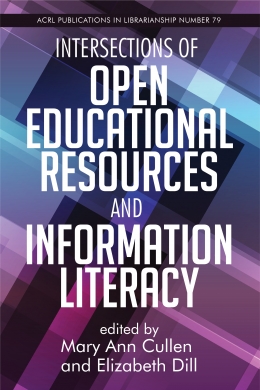Primary tabs
You don't need to be an ALA Member to purchase from the ALA Store, but you'll be asked to create an online account/profile during checkout to proceed. This Web Account is for both Members and non-Members. Note that your ALA Member discount will be applied at the final step of the checkout process.
If you are Tax-Exempt, please verify that your account is currently set up as exempt before placing your order, as our new fulfillment center will need current documentation. Learn how to verify here.
- Description
- Table of Contents
- About the authors
"The present volume is timely not only because it models creative and effective strategies to advance both open education and information literacy, but especially because it poses critical questions and urges practitioners to go well beyond questions of access to and the use of information. It demands reflection on what is being accessed (and what is not), who is gaining access (and who is not), who is providing access (and who is not), and what the goal is of this access (and what lies beyond access)."
—from the Foreword by Rajiv S. Jhangiani
Information literacy skills are key when finding, using, adapting, and producing open educational resources (OER). Educators who wish to include OER for their students need to be able to find these resources and use them according to their permissions. When open pedagogical methods are employed, students need to be able to use information literacy skills as they compile, reuse, and create open resources.
Intersections of Open Educational Resources and Information Literacy captures current open education and information literacy theory and practice and provides inspiration for the future. Chapters include practical applications, theoretical musings, literature reviews, and case studies and discuss social justice issues, collaboration, open pedagogy, training, and advocacy. The book is divided into six parts:
- Foundations
- Teaching Info Lit with OER
- Librarian Support of Open Pedagogy/OER
- Social Justice/Untold Stories
- Student Advocacy
- Spreading the Love: Training Future Advocates and Practitioners
Chapters cover topics including library-led OER creation; digital cultural heritage and the intersections of primary source literacy and information literacy; situated learning and open pedagogy; critical librarianship and open education; and developing student OER leaders.
Intersections of Open Educational Resources and Information Literacy—which went through an open peer review process—informs and inspires on OER, info lit, and their many iterative convergences. It is available as an open access edition at https://bit.ly/ACRLOERInfoLit.
Foreword, Rajiv S. Jhangiani
Acknowledgements
Introduction
Part 1: Foundations
Chapter 1. An Open Primer: OER, Open Pedagogy, and Information Literacy
Mary Ann Cullen
Chapter 2. Information Literacy and Open Education: Parallel Tracks Toward a Common Destination
Paul Bond
Chapter 3. OER-Enabled Pedagogy Meets Info Lit: Empowering the Next Generation of Open Scholars
Lindsey Gumb
Part 2: Teaching Info Lit with OER
Chapter 4. “All the Better to Teach You With”: Integrating Information Literacy, Academic Composition, Fairy Tales, and OER
Rosie Liljenquist and Charla Strosser
Chapter 5. Library-Led OER Creation: Case Study of a Collaborative Information Literacy Project
James H. Cason and Nora B. Rackley
Chapter 6. Open GLAM as OER: Digital Cultural Heritage and the Intersections of Primary Source Literacy and Information Literacy
Roger Gillis
Part 3: Librarian Support of Open Pedagogy/OER
Chapter 7. Supporting Open Pedagogy with Information Literacy Instruction for Multimodal Composition Projects
Mandi Goodsett
Chapter 8. Situated Learning and Open Pedagogy: Pathways for Undergraduate Students’ Emerging Information Literacies
Christina Riehman-Murphy
Chapter 9. The Open Shark Tank: A Case Study of Business Research Methods II
Dawn Lowe-Wincentsen
Chapter 10. Students Speak: Animating Stories about the Value of Information
Vanessa Arce and Rena D. Grossman
Part 4: Social Justice/Untold Stories
Chapter 11. Critical Librarianship and Open Education: A Solution to Information Injustice
Kathy Swart
Chapter 12. Doing Away with the “Curricular Black Box”: Empowering Students as OER Creators to Challenge Information Privilege
Yolanda Bergstrom-Lynch, Mary Mahoney, and Joelle Thomas
Part 5: Student Advocacy
Chapter 13. Developing Student OER Leaders: Student Advocacy and Outreach Through Open Pedagogy
Jen Hughes and Andrea Scott
Chapter 14. Fostering OER Student Champions Through Hiring Practices and Collaborative Projects
Ariela McCaffrey
Part 6: Spreading the Love: Training Future Advocates and Practitioners
Chapter 15. Framing Open Education Within the Library
Amanda C. Larson
Chapter 16. Breaking Open: Defining a Student-Centered Pedagogy
Shawn(ta) Smith-Cruz and Elvis Bakaitis
Chapter 17. Collaborating to Support Learner Empowerment Through Information Literacy, OER & OEP
Jessica O’Reilly, Marnie Seal, and Mel Young
About the Authors
Index
Mary Ann Cullen
Mary Ann Cullen is an associate professor and Associate Department Head at Georgia State University’s Alpharetta Campus. She has been involved in the open and affordable educational resources movement since 2013, when she participated in the adaptation of an OER text for an introductory English composition course. Since then, she has assisted faculty with OER adoption and grants, and presented about librarians’ roles in OER at ACRL, the Distance Library Services Conference, and a Carterette Series webinar. She has been recognized as an Affordable Learning Georgia Featured Advocate and co-edited the Fall 2020 special edition of the academic journal, Library Trends, “OER and the Academic Library,” with Elizabeth Dill.
Elizabeth Dill
Elizabeth Dill is the Director of University Libraries at the University of Hartford in West Hartford, CT. As an instructor of university-level theater classes, she assigned OER, facilitating open pedagogy. She has also used her librarian role to advocate for OER. Dill has presented at national and international conferences on Open Educational Resources. Dill co-edited the Fall 2020 special edition of the academic journal, Library Trends, “OER and the Academic Library.”



